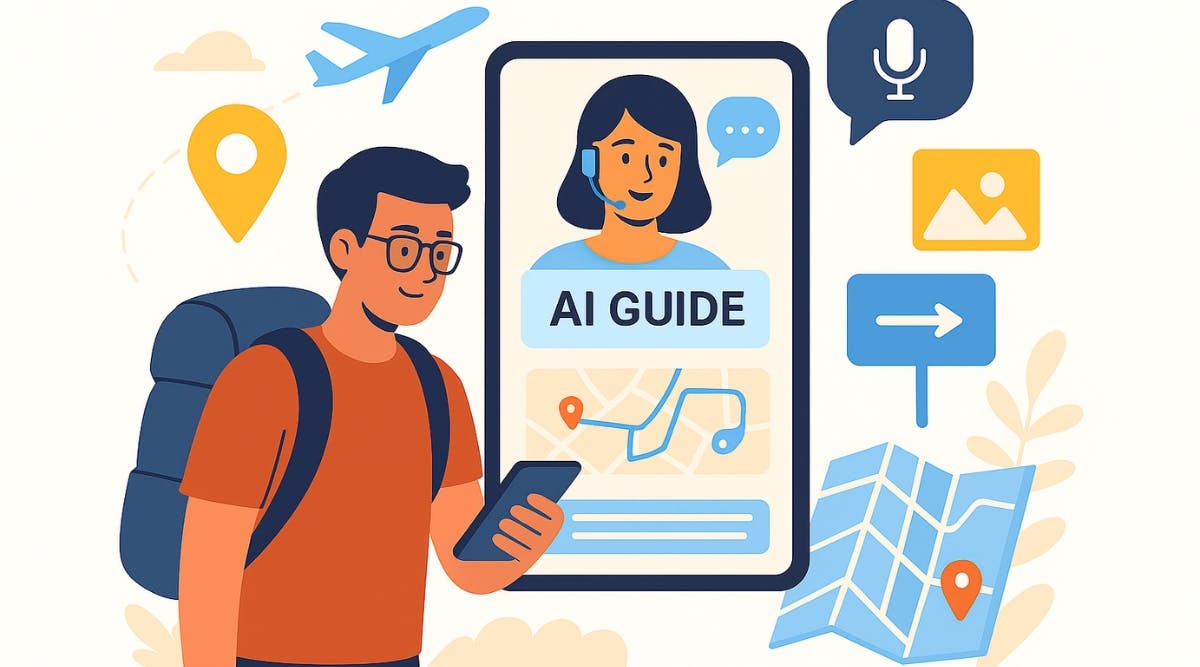The Future of Travel: Multimodal AI Journey Guides
Travel is stepping into a new era. The time of flipping through guidebooks or browsing countless websites is slowly disappearing. The future now belongs to multimodal AI travel guides—smart assistants that blend text, voice, images, and maps to deliver smooth, connected travel experiences. These AI-powered companions are reshaping tourism by providing real-time assistance, cultural insights, and personalized itineraries all in one place.
What Are Multimodal AI Journey Guides?
A multimodal AI travel guide is more than just an app. It can understand text, photos, voice, and location data to deliver instant, accurate answers.
Imagine pointing your phone at a landmark and instantly learning its history, nearby attractions, and the best local food spots around. Or taking a photo of a Thai menu and watching the AI translate it while recommending the most authentic dish to try. This is the power of AI travel assistants—combining multiple modes into one seamless travel companion.
Why Multimodal AI Travel Guides Matter
Every traveler is unique. Some prefer structured itineraries, while others like spontaneous adventures. A multimodal AI guide adapts to both by offering:
- Real-time support for delays, weather updates, or last-minute bookings.
- AI travel itineraries designed around your budget, schedule, and interests.
- Interactive discovery with photo recognition, live maps, and voice commands.
Instead of wasting hours on research, travelers get direct, personalized answers that fit their style of travel. This reduces stress and makes every trip more meaningful.
Read More: Which AI Is Best for Travel Planning?

The Future of Travel with AI
The role of AI in tourism goes far beyond booking tickets. With multimodal guides, travel becomes smarter, safer, and more connected:
1. Smarter Itineraries
AI-powered itinerary planners create balanced schedules that mix top attractions with hidden gems. By studying real-time data like events, traffic, and crowd levels, these itineraries adapt to changing conditions.
2. Language and Culture Support
Language barriers often make travel stressful. With AI translation tools, travelers can instantly read signs, menus, and conversations. More importantly, the AI explains cultural etiquette—helping visitors connect with locals in a respectful way.
3. Easy Transport Navigation
From flights and trains to local taxis, AI journey guides recommend the best routes. They predict delays, suggest alternatives, and give real-time travel alerts so tourists spend less time waiting and more time exploring.
4. Safety and Smart Guidance
AI assistants use GPS, photo recognition, and live alerts to guide travelers safely. They highlight safe neighborhoods, offer emergency contact options, and suggest trusted local services when needed.
Benefits for Travelers and Businesses
- For Travelers: Personalized experiences, reduced stress, smarter schedules, and deeper cultural immersion.
- For Tourism Businesses: Airlines, hotels, and local operators can use AI-driven recommendations to connect directly with tourists, offer tailored services, and build stronger customer trust.
With generative AI optimization, travel content and recommendations reach modern travelers faster, ensuring they find exactly what they need without endless searching.
Explore More: How to Use AI to Plan a Road Trip: Guide for Smarter Travel
Conclusion
The future of travel lies with multimodal AI journey guides—digital companions that combine planning, booking, navigation, translation, safety, and discovery into a single platform. Travelers no longer need to switch between multiple apps or websites. One AI assistant can understand their needs, adapt to changes, and provide real-time solutions.
This is more than a trend; it is the next generation of tourism. With AI-powered travel guides, trips move from searching for information to fully experiencing it. Travel becomes smoother, safer, and more personal, guided by technology that feels like a trusted companion.
FAQs on on Multimodal AI Journey Guides
What is a multimodal AI journey guide?
It is an AI-powered travel guide that uses text, voice, maps, and images to provide real-time travel support and recommendations
How does AI improve trip planning?
A personalized AI travel planner creates itineraries by analyzing interests, budget, and timing, saving hours of manual research
Can multimodal AI help with translations abroad?
Yes, it offers AI language translation for travelers along with cultural insights, making communication much easier.
Is AI travel assistance useful during emergencies?
Absolutely. A smart travel assistant gives live updates, safer routes, and quick solutions during delays or disruptions.
Why should travel businesses adopt multimodal AI?